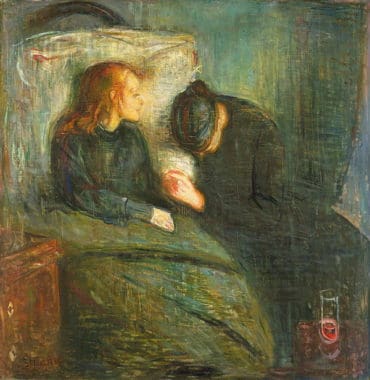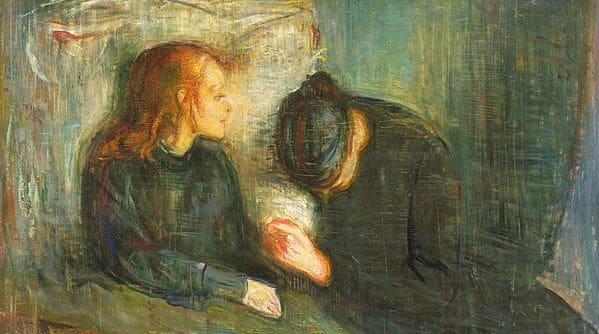Responding to Assisted Suicide Issues
(Part I of II)
Dear Fr. Bartunek, as usual, your reflections are quite helpful and I often share your wisdom with others. However, I have a big question regarding the idea that God permits some evil, and the suffering that comes from it, even the suffering of innocents. Recently, I had a discussion with my ob-gyn regarding assisted suicide, which is now legal in California. Her question was  why should young children suffer the ravages of cancer or other dreaded diseases which involve such catastrophic suffering? Further, she said: We put animals down when they are suffering. I attempted to explain that children are not like animals, in that they have souls and we cannot put them down. She witnessed her father going through an agonizing process of dying and said she saw the assisted suicide in those cases, not a problem. I also attempted an explanation of suffering to be a way of joining our suffering to that of Christ on the cross. This she totally disagreed with because, as she said, that was different for Him and He didn’t experience the suffering. I tried explaining that Jesus took on our humanity and did suffer exactly the same way we do. Please help, Fr. Bartunek. One, about her response to ending a child’s life because of suffering, and two, about Jesus, in His humanity, suffering.
why should young children suffer the ravages of cancer or other dreaded diseases which involve such catastrophic suffering? Further, she said: We put animals down when they are suffering. I attempted to explain that children are not like animals, in that they have souls and we cannot put them down. She witnessed her father going through an agonizing process of dying and said she saw the assisted suicide in those cases, not a problem. I also attempted an explanation of suffering to be a way of joining our suffering to that of Christ on the cross. This she totally disagreed with because, as she said, that was different for Him and He didn’t experience the suffering. I tried explaining that Jesus took on our humanity and did suffer exactly the same way we do. Please help, Fr. Bartunek. One, about her response to ending a child’s life because of suffering, and two, about Jesus, in His humanity, suffering.
Fr. Bartunek, I understand that what I am asking about this suffering may not be the result of evil; but I had not found an answer to this physician’s questions from someone whose opinion I respected, as I do yours. Thanks again for all of your many explanations and much-needed help over the years at SpiritualDirection.com.
It is so encouraging to hear that you are having meaningful conversations with your doctor! And your desire to give worthy answers to worthy questions is a blessing in itself. It shows that the Holy Spirit is present in your soul, moving you to love your neighbor by sharing with them the saving truth that God came to earth to reveal to us.
Winning Arguments?
Before getting to the specific issues that you raise, it is important to remember that we are not called to win every argument. Even when our answers are logical and reasonable, that doesn’t mean that we will always convince those we are dialoguing with. Human beings are not purely rational. We have deep emotional experiences, and these sometimes create filters or obstacles that keep us from seeing the whole truth of even what may be a very reasonable argument.
Also, our free will is actually a separate faculty (a faculty is a capacity of the soul) from our intelligence. Even when our intelligence indicates that something may be true, we are still free to adhere to that truth or not. And when a truth makes us uncomfortable, sometimes we would prefer not to adhere to it, so we look around for justifications that will keep the truth at arm’s length. I am not saying that this is the case with your doctor, but I am saying that we need to remain humble and calm in all our interactions with people when it comes to trying to explain what we believe, what the Church teaches, and why. Jesus himself didn’t convince all of the Pharisees – and he surely didn’t lack any knowledge or any arguments!
The Suffering of Innocents
The suffering of innocents is one of the most difficult realities to understand and accept. It is the core of what theologians and philosophers have so often called “the problem of evil.” In a certain sense, only the entire message of Christ is an answer to this problem. As the Catechism puts it in #309:
If God the Father almighty, the Creator of the ordered and good world, cares for all his creatures, why does evil exist? To this question, as pressing as it is unavoidable and as painful as it is mysterious, no quick answer will suffice. Only Christian faith as a whole constitutes the answer to this question: the goodness of creation, the drama of sin and the patient love of God who comes to meet man by his covenants, the redemptive Incarnation of his Son, his gift of the Spirit, his gathering of the Church, the power of the sacraments and his call to a blessed life to which free creatures are invited to consent in advance, but from which, by a terrible mystery, they can also turn away in advance. There is not a single aspect of the Christian message that is not in part an answer to the question of evil.
Original sin was a terrible thing. It introduced evil and injustice into the world. Because of it, we live in a fallen world, full of suffering, even the suffering of innocents. Only after Jesus comes again and inaugurates the new heavens and the new earth will all evil, suffering, and injustice be remedied. And it will be. We can count on that.
But in the meantime, this fallen world continues to crucify those who are innocent, even as it crucified Jesus. A suffering child or infant is, in a sense, a martyr, a victim of the evil that pulses through the world because of sin. Just as the babies in Bethlehem were horribly massacred in an attempt to destroy the baby Jesus, so the forces of dissolution continue to rage against goodness, even in the form of sickness and disease.
+
Editor’s Note: In Part II, we will look at the sacredness of human life and the fact that suffering can have meaning.
Art: The Sick Child, Edvard Munch, 1896, PD published in the US prior to January 1, 1923, Wikimedia Commons.


